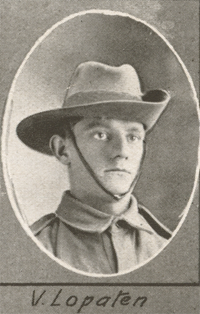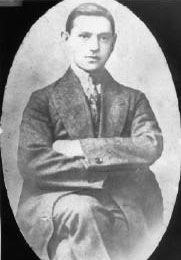Vladimir Paul Lopaten
| Russian spelling | Владимир Павлович Лопатин |
|---|---|
| Born | 8.07.1892 |
| Place | Aleksino, Smolensk, Russia |
| Ethnic origin | Russian |
| Religion | Russian Orthodox |
| Father | Paul Jacob Lopaten |
| Family | Wife Elsie Lopaten (née Clarkson), married 1923; daughters Letty Larose b. 1925, Joan Tehersa (sic) b.1926, son Ronald Paul b. 1930 |
| Arrived at Australia |
from Harbin, China on 24.01.1913 per St Albans disembarked at Brisbane |
| Residence before enlistment | Brisbane |
| Occupation | 1915-1921 labourer, 1922 printer |
| Naturalisation | 1922 |
| Residence after the war | Brisbane, Bingera, Ingham, Stanthorpe, Brisbane, Southport, Qld |
| Died | 7.10.1961, Qld |
Service #1
| Service number | 2230 |
|---|---|
| Enlisted | 27.04.1915 |
| Place of enlistment | Longreach, Qld |
| Unit | 15th Battalion |
| Rank | Private |
| Place | Gallipoli, 1915 |
| Casualties | WIA 1915 |
| Final fate | RTA 11.03.1916 |
| Discharged | 14.06.1916 |
Materials
Digitised naturalisation (NAA)
Digitised service records (NAA)
Digitised Embarkation roll entry (AWM)
Alien registration (NAA)
Medical case file (NAA)
Crematorium records (NAA)
Blog article
From Russian Anzacs in Australian History:
Ron Lopaten, reflecting on his father's escape from Russia in 1913 with four other 20-year-olds, says: 'I am not sure why he came to Australia, ... they all decided to take off for some specific reason, either for adventure or to get away from something. The only thing I can guess is that he did not want to end up in the czar's army. He did say that there were signs on the parks which said "No soldiers or dogs allowed". He did mention that. I guess in 1913 the Russian army was not very well treated or not very well paid.'
[...] 'My father never mentioned anything about Gallipoli', Vladimir Lopaten's son says, 'other than the fact that when he was wounded he was laying sandbags, and he was bending over, laying down a sandbag and he was shot by a sniper, the bullet passed through his lung, just missed his heart, came out his back and then the bullet hit a New Zealander in the bottom! So the New Zealander was jumping up and down.' Russian Anzacs seemed to be able to see the funny side of things even when in mortal danger, just like their Australian comrades did.
Gallery

Vladimir Lopaten
Queenslander Pictorial, supplement to The Queenslander, 24 July 1915, p. 26

Vladimir Lopaten
courtesy of Ron Lopaten
 Russian Anzacs
Russian Anzacs